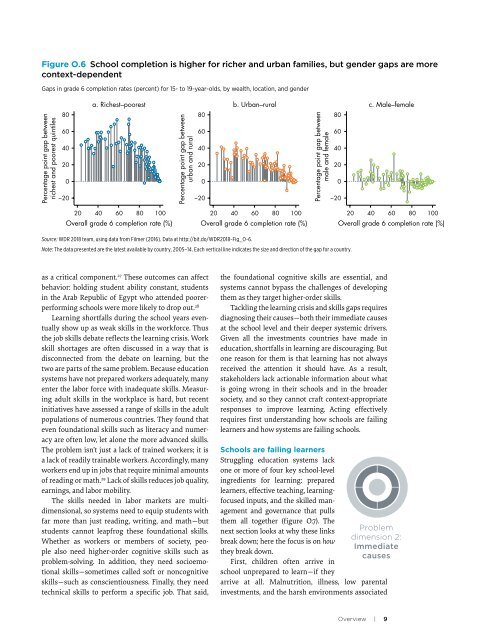Brasil só deve dominar Leitura em 260 anos, aponta estudo do Banco Mundial Relatorio Banco Mundial _Learning
You also want an ePaper? Increase the reach of your titles
YUMPU automatically turns print PDFs into web optimized ePapers that Google loves.
Figure O.6 School completion is higher for richer and urban families, but gender gaps are more<br />
context-dependent<br />
Gaps in grade 6 completion rates (percent) for 15- to 19-year-olds, by wealth, location, and gender<br />
Percentage point gap between<br />
richest and poorest quintiles<br />
80<br />
60<br />
40<br />
20<br />
0<br />
−20<br />
a. Richest–poorest<br />
Percentage point gap between<br />
urban and rural<br />
80<br />
60<br />
40<br />
20<br />
0<br />
−20<br />
b. Urban–rural<br />
Percentage point gap between<br />
male and f<strong>em</strong>ale<br />
80<br />
60<br />
40<br />
20<br />
0<br />
−20<br />
c. Male–f<strong>em</strong>ale<br />
20 40 60 80 100<br />
20 40 60 80 100<br />
20 40 60 80 100<br />
Overall grade 6 completion rate (%) Overall grade 6 completion rate (%) Overall grade 6 completion rate (%)<br />
Source: WDR 2018 team, using data from Filmer (2016). Data at http://bit.<strong>do</strong>/WDR2018-Fig_O-6.<br />
Note: The data presented are the latest available by country, 2005–14. Each vertical line indicates the size and direction of the gap for a country.<br />
as a critical component. 27 These outcomes can affect<br />
behavior: holding student ability constant, students<br />
in the Arab Republic of Egypt who attended poorerperforming<br />
schools were more likely to drop out. 28<br />
<strong>Learning</strong> shortfalls during the school years eventually<br />
show up as weak skills in the workforce. Thus<br />
the job skills debate reflects the learning crisis. Work<br />
skill shortages are often discussed in a way that is<br />
disconnected from the debate on learning, but the<br />
two are parts of the same probl<strong>em</strong>. Because education<br />
syst<strong>em</strong>s have not prepared workers adequately, many<br />
enter the labor force with inadequate skills. Measuring<br />
adult skills in the workplace is hard, but recent<br />
initiatives have assessed a range of skills in the adult<br />
populations of numerous countries. They found that<br />
even foundational skills such as literacy and numeracy<br />
are often low, let alone the more advanced skills.<br />
The probl<strong>em</strong> isn’t just a lack of trained workers; it is<br />
a lack of readily trainable workers. Accordingly, many<br />
workers end up in jobs that require minimal amounts<br />
of reading or math. 29 Lack of skills reduces job quality,<br />
earnings, and labor mobility.<br />
The skills needed in labor markets are multidimensional,<br />
so syst<strong>em</strong>s need to equip students with<br />
far more than just reading, writing, and math—but<br />
students cannot leapfrog these foundational skills.<br />
Whether as workers or m<strong>em</strong>bers of society, people<br />
also need higher-order cognitive skills such as<br />
probl<strong>em</strong>-solving. In addition, they need socio<strong>em</strong>otional<br />
skills—sometimes called soft or noncognitive<br />
skills—such as conscientiousness. Finally, they need<br />
technical skills to perform a specific job. That said,<br />
the foundational cognitive skills are essential, and<br />
syst<strong>em</strong>s cannot bypass the challenges of <strong>deve</strong>loping<br />
th<strong>em</strong> as they target higher-order skills.<br />
Tackling the learning crisis and skills gaps requires<br />
diagnosing their causes—both their immediate causes<br />
at the school level and their deeper syst<strong>em</strong>ic drivers.<br />
Given all the investments countries have made in<br />
education, shortfalls in learning are discouraging. But<br />
one reason for th<strong>em</strong> is that learning has not always<br />
received the attention it should have. As a result,<br />
stakeholders lack actionable information about what<br />
is going wrong in their schools and in the broader<br />
society, and so they cannot craft context-appropriate<br />
responses to improve learning. Acting effectively<br />
requires first understanding how schools are failing<br />
learners and how syst<strong>em</strong>s are failing schools.<br />
Schools are failing learners<br />
Struggling education syst<strong>em</strong>s lack<br />
one or more of four key school-level<br />
ingredients for learning: prepared<br />
learners, effective teaching, learningfocused<br />
inputs, and the skilled manag<strong>em</strong>ent<br />
and governance that pulls<br />
th<strong>em</strong> all together (figure O.7). The<br />
next section looks at why these links Probl<strong>em</strong><br />
dimension 2:<br />
break <strong>do</strong>wn; here the focus is on how<br />
Immediate<br />
they break <strong>do</strong>wn.<br />
causes<br />
First, children often arrive in<br />
school unprepared to learn—if they<br />
arrive at all. Malnutrition, illness, low parental<br />
investments, and the harsh environments associated<br />
Overview | 9








